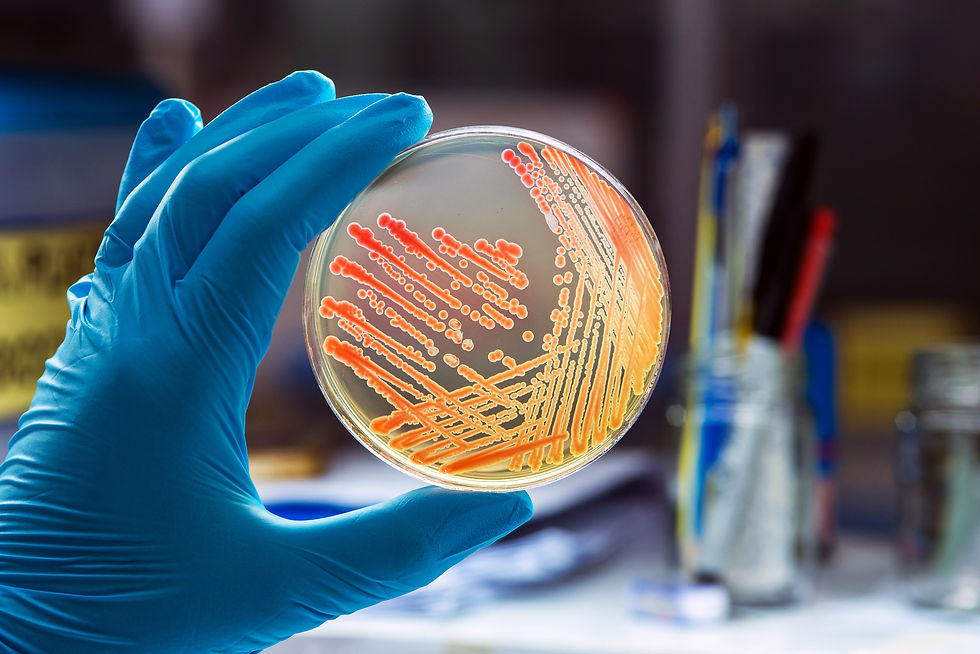BioLogos Debate: Evolving Bacteria?
- Kevin
- Oct 21, 2017
- 3 min read
Updated: Jun 27, 2020

As I shared in Part 5 of 7 of the BioLogos debate, the BioLogos Facebook page administrator jumped back into the discussion and attempted to answer my three original questions. Since my rebuttal is lengthy, I am splitting it between Parts 5, 6, and 7 of this blog post series. Here is the second question that BioLogos attempts to answer, as shared in Part 1 of 7:
2. Since molecules-to-man evolution requires growth in genetic information and complexity, can you provide an example of observable evidence of an organism gaining new genetic information/complexity? For instance, can you provide an observable example of an organism that had no eyes, but then evolved eyesight?
In Part 6 of 7 below, I respond to BioLogos’ claim that nylonase and bacterial resistance to antibiotics are observable examples of organisms gaining new genetic information and complexity. Note: see Part 5 of 7 for BioLogos' complete message, along with the links that they shared.
Me:
“2. “Nylonase” [link].” I am familiar with this argument as well. Arthrobacter sp. K172 gained the ability to digest byproducts of nylon wastewater. The bacteria underwent a point mutation of a particular enzyme, EII. The normal function of this enzyme breaks down a substance that is chemically similar to nylon. The mutation slightly altered the enzyme, giving it the ability to break down nylon. As for the observational science aspect of this, there is indeed somewhat of a disagreement between creation scientists and evolutionary scientists on the nature of the change. While evolutionists claim that this is “evolution-in-action,” creation scientists note the fact that this is another example of the alteration of already-existing genetic information (see http://creation.com/images/pdfs/tj/j29_1/j29_1_95-102.pdf), and therefore, there is no real gain in information and complexity, despite the “beneficial” outcome. If there was an observable example of something that required a dramatic increase in genetic information and complexity, such as an originally blind organism growing functioning eyes, then that would be a different story. Yet, we have never observed mutations produce those types of results. Instead, mutations typically tend to be either nearly neutral or deleterious. Even much of the secular research draws these conclusions, as noted by Dr. Jack Sanford in his book called Genetic Entropy, which I highly recommend (https://answersingenesis.org/store/product/genetic-entropy-mystery-genome/). “Here's another cool example: [link]” I watched the video, and I am familiar with this argument as well. Similar to the nylon-eating bacteria, even bacterial resistance to antibiotics is another example of the loss or distortion of already-existing genetic information. For example, if the bacteria mutates so that it no longer produces a protein that would normally react to the antibiotic, then although it may be “beneficial” in a specific environment, it is not an ultimate gain of new information and complexity. In fact, that is a loss of genetic information. Moreover, the bacteria are still bacteria, and have not changed into something more complex, such as a jelly fish. If we have never observed large, “uphill” changes in the phenotype of an organism, such as an originally blind organism developing eyes, or a bacteria changing into a fish, then doesn’t the evolutionary worldview require a lot of faith to believe in the billions/trillions of evolutionary advancements required for molecules-to-man evolution?
Notice how BioLogos’ arguments are very similar to the ones used by humanists on the Friendly Atheist Facebook page, as I shared in the “Overwhelming Evidence” blog post series. Here’s one example. Sadly, instead of trusting the absolute authority of God’s Word on the topic of origins, BioLogos trusts Man’s word instead. That is the essence of the religion of humanism. Again, I am not claiming that the professing Christians at BioLogos are not born again in Christ, especially since our salvation is ultimately dependent on our repentance toward God, and our trust in the person and work of Jesus Christ (Acts 20:21). Regardless of whether or not the BioLogos staff are born again, my claim is that they are trying to mix two religions: Christianity and humanism. Compromising God's Word with Man's word does nothing to increase faith in God's Word, and often leads young people astray [1].
I will share the final part of my rebuttal in Part 7 of 7 of this series. Moreover, BioLogos briefly responded to my rebuttal, and I will share that in the next post as well.
1. I recommend the following book to learn more: https://answersingenesis.org/store/product/ready-return/




Comments